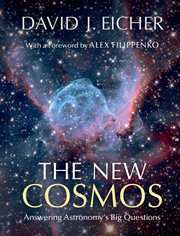Book contents
- Frontmatter
- Dedication
- Contents
- Foreword
- Preface
- Acknowledgments
- 1 The awakening of astronomy
- 2 How the Sun will die
- 3 The end of life on Earth
- 4 How the Moon formed
- 5 Where has all the water gone?
- 6 Why did Venus turn inside-out?
- 7 Is Pluto a planet?
- 8 Planets everywhere…
- 9 The Milky Way as barred spiral
- 10 Here comes Milkomeda
- 11 The Big Bang's cosmic echo
- 12 How large is the universe?
- 13 The mystery of dark matter
- 14 The bigger mystery of dark energy
- 15 Black holes are ubiquitous
- 16 What is the universe's fate?
- 17 The meaning of life in the universe
- Glossary
- Bibliography
- Index
17 - The meaning of life in the universe
Published online by Cambridge University Press: 05 December 2015
- Frontmatter
- Dedication
- Contents
- Foreword
- Preface
- Acknowledgments
- 1 The awakening of astronomy
- 2 How the Sun will die
- 3 The end of life on Earth
- 4 How the Moon formed
- 5 Where has all the water gone?
- 6 Why did Venus turn inside-out?
- 7 Is Pluto a planet?
- 8 Planets everywhere…
- 9 The Milky Way as barred spiral
- 10 Here comes Milkomeda
- 11 The Big Bang's cosmic echo
- 12 How large is the universe?
- 13 The mystery of dark matter
- 14 The bigger mystery of dark energy
- 15 Black holes are ubiquitous
- 16 What is the universe's fate?
- 17 The meaning of life in the universe
- Glossary
- Bibliography
- Index
Summary
Nothing drives astronomy like that oldest of all philosophical questions: Are we alone in the universe? Spacecraft missions concentrate on Mars because of the Red Planet's relative similarity to Earth and the existence of water there, leading to the possibility of microbial life. The rapidly growing cottage industry of finding and studying extrasolar planets looks forward to detecting Earth analogs that may also reveal atmospheric signatures of living beings. The discovery of life elsewhere in the cosmos would certainly mark one of the most incredible moments in human history, a milestone at which we would understand we are not unique in the universe.
Of course, we know of only one example of life in the universe, right here on Earth. In the minds of some, that means the odds of life being an extremely rare thing in the cosmos are high. At least intelligent life; civilizations that could communicate. They point back to the idea that Italian physicist Enrico Fermi (1901–1954) raised in 1950: “If the universe contains life, then where is it? Why hasn't life showed up on our doorstep?” The so-called Fermi Paradox still stands as a fair question. But the odds of life in the universe are staggeringly large, overwhelmingly so, in the minds of the majority of astronomers and cosmologists.
Recall that the universe contains at least 100 billion galaxies, and probably considerably more because inflation theory means we are not seeing the whole universe that exists. And let's consider the number of stars in a galaxy like the Milky Way, about 400 billion. Let's set inflation aside. From what we see of star systems near the Sun, planetary systems appear to be common, and we are seeing the first glimpses of planets within the habitable zones of their suns – the areas in which water would be a liquid. From what we can see, water is essential for life.
Astronomers currently believe that something like 70 or 80 percent of stars have planets. With 100 billion galaxies in the universe and to play it conservatively, let's assume roughly 100 billion stars on average for each galaxy. That works out to 10,000 billion billion stars in the universe, and roughly 1022 planetary systems, or 8,000 billion billion.
- Type
- Chapter
- Information
- The New CosmosAnswering Astronomy's Big Questions, pp. 224 - 238Publisher: Cambridge University PressPrint publication year: 2015



